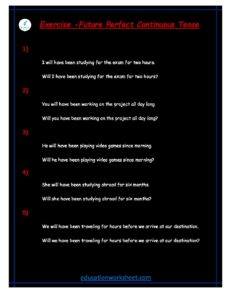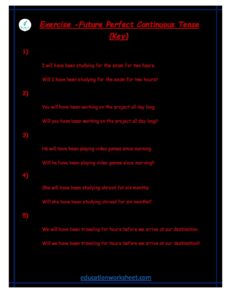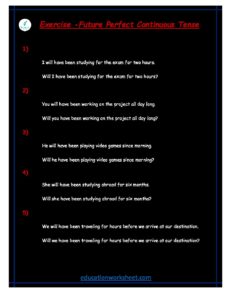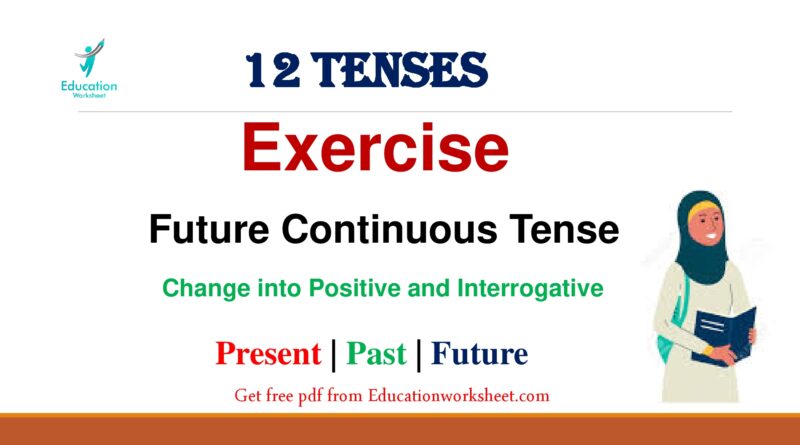changing Future Continuous Tense to positive and interrogative
changing Future Continuous Tense to positive and interrogative
Tenses play a crucial role in structuring sentences and conveying the timing of actions and events. One of the key tenses in English is the Future Continuous tense. It is used to describe actions or events that will be ongoing at a specific point in the future. In this guide, we will explore how to transform Future Continuous tense sentences from their standard form into both positive and interrogative forms. By the end of this discussion, you will have a comprehensive understanding of how to manipulate the Future Continuous tense to create various sentence structures.
I. Future Continuous Tense Overview:

Before we dive into transforming Future Continuous tense sentences, let’s briefly recap what this tense is and how it is typically formed.
The Future Continuous tense is used to describe actions that will be in progress at a particular moment in the future. It is typically constructed using the future auxiliary verb “will” and the base form of the main verb + “ing.”
Positive Form: Subject + will + be + base form of the verb + -ing
For example:
- She will be studying for her exams tomorrow.
Negative Form: Subject + will + not + be + base form of the verb + -ing
For example:
- They will not be working on the project next week.
Interrogative Form: Will + subject + be + base form of the verb + -ing?
For example:
- Will you be attending the conference next month?
Now, let’s explore how to transform these sentences from the standard form into positive and interrogative forms.
II. Changing Future Continuous Tense to Positive Form:

To change Future Continuous tense sentences into the positive form, we simply need to use the subject followed by “will be” and the base form of the verb with -ing.
- Original: She will be studying for her exams tomorrow. Positive: She will be studying for her exams tomorrow.
- Original: They will not be working on the project next week. Positive: They will be working on the project next week.
- Original: Will you be attending the conference next month? Positive: You will be attending the conference next month.
As shown in the examples, the transformation from the standard Future Continuous tense to the positive form is quite straightforward. The structure remains largely the same; we only omit the negation and the auxiliary verb “will” moves right next to the subject.
III. Changing Future Continuous Tense to Interrogative Form:

Transforming Future Continuous tense sentences into interrogative forms involves rearranging the sentence structure. In interrogative sentences, the auxiliary verb “will” is placed at the beginning, followed by the subject and then “be” with the base form of the verb + -ing.
- Original: She will be studying for her exams tomorrow. Interrogative: Will she be studying for her exams tomorrow?
- Original: They will not be working on the project next week. Interrogative: Will they be working on the project next week?
- Original: Will you be attending the conference next month? Interrogative: Will you be attending the conference next month?
To summarize, when changing Future Continuous tense sentences into interrogative forms, the key steps are to move the auxiliary verb “will” to the beginning, place the subject after it, and follow with “be” and the base form of the verb with -ing. This change in word order is what creates the interrogative structure.
IV. Practice Exercises:
To solidify your understanding of changing Future Continuous tense to positive and interrogative forms, let’s do some practice exercises.
Positive Form:
- They (work) on the new project next week.
- I (not eat) dinner at that time.
- You (study) for your exam tomorrow.
Interrogative Form:
- (She / dance) at the party tonight?
- (Will / they / travel) to Europe next summer?
- (You / play) the piano during the event?
Try to solve these exercises on your own before checking the answers below.
Positive Form Answers:
- They will be working on the new project next week.
- I will not be eating dinner at that time.
- You will be studying for your exam tomorrow.
Interrogative Form Answers:
- Will she be dancing at the party tonight?
- Will they be traveling to Europe next summer?
- Will you be playing the piano during the event?

